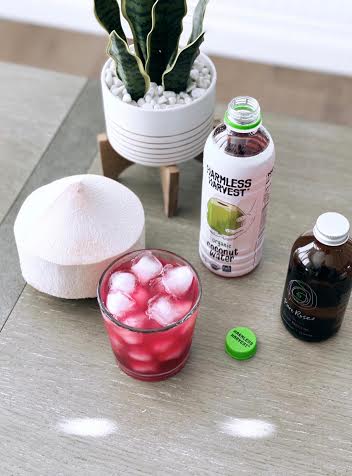It was an exciting time for me. Throughout the span of 15 months, I journeyed throughout Asia, Europe and the Mediterranean, catering to all the whimsies of a carefree and self-indulgent mind. I focused on nothing other than laying my eyes on the wonders of the world and over-saturating my tastebuds with as many local delicacies as my appetite allowed.
It was spectacular. Amidst the savory, the sour, the shocking, and the sweet, I found one common theme among delicacies throughout these vastly different international communities that I never before knew I craved: the rose. Yes, the rose, as in rose milk tea, rose jelly cups, rose Turkish delights, rose mochi, rose pudding – it was as though the rest of the world had understood and harnessed the powers and flavors of this flower and super herb, and as a self-proclaimed gastronome, I have no idea how I hadn’t caught on earlier.
15 pounds heavier, and ten-fold happier, I eventually (and begrudgingly) made my way home stateside to my tiny (though mighty) urban microcosm of the globe, New York City. My plan was a simple one. I would dive back into my daily routines and absolutely insist on maintaining the peace and balance I accessed during my travels. And, of course, start racking up on all the rose products I could get my hands on. Now, here, is precisely where I found an obstacle.
Snug at home and feverishly browsing sites across multiple devices, I wasn’t finding anything remotely similar to the natural, organic rose products I experienced abroad. What I did find, were an abhorrent amount of chemicals, high-fructose corn syrup, food coloring, gums, and an assortment of unsavory things I’m sure should never be found in the human body; all sorely discouraging.
What slipped my mind, however, was the fact that we currently live in this grand old age of information, and oftentimes mindlessly allow technology to navigate our moves. After a few disappointing hours of searching for ways to feed my rose cravings, the following day, my social media news feeds brilliantly led me to one very unique discovery: Pure Rose. “AH-HA!” I exclaimed out loud in my apartment. This certainly looked like a qualified contender, if ever there was one.
Born in Bulgaria. Made with love in California. Now we’re talking! I needed to know more. A Bulgarian Rose super herb with healing and beautifying powers? Rosa Damascena. Had it been my BODY craving the rose all along when I mistakenly thought it was simply my tastebuds craving it? Rose Nectar. Rose Yummies. Science and ancient wisdom. I felt I had stumbled upon a secret gold mine.
Bulgarian Rose essential oil. Backed by science. Flavonoids. Supercharging immunity. Age defeating. Before I knew it, I had digested all of Pure Rose’s content on Rosa Damascena and I wanted my delivery of Bulgarian Rose Nectar NOW. This was it – this was how I was going to quench my thirst for all things rose right at home in NYC. I hesitated for one moment… it seemed that all domestic products I browsed thus far were anything but organic and safe. Instinctively, I sent a quick note to Pure Rose with one question: Can you confirm that Rosa Damascena oil is ingestible?
Well, thank goodness! The response I received was swift, thorough, positive, and directly from the CEO. Organic Bulgarian Rose oil, I learned, is not only ingestible but incredibly healthy with a notable range of benefits to our wellbeing. This piqued my curiosity and after a few more rapid exchanges on ingestible Bulgarian Rose products found stateside, I was left with some new nuggets of wisdom.
The Pure Rose team was happy to educate, and explained the importance of understanding exactly which oils are and are not deemed safe to ingest. They advised that, fortunately, Rosa Damascena essential oil has been deemed to be in the category of “Generally Recognized as Safe” (GRAS) by the Food and Drug Administration (FDA). Substances generally recognized as safe by qualified experts means that a substance has adequately proven it is harmless under conditions of its intended use.
While Bulgarian Rose essential oil is recognized worldwide to be in the GRAS category of edible goods, it is equally as important to understand the authenticity of a Bulgarian Rose oil product, they emphasized. The Pure Rose team shared their knowledge on bolstering the Rosa Damascena’s benefits, explaining it is absolutely mandatory to use organic rose oil, especially given the high concentration of non-organic products in the food market today, which contribute to the high concentration of pesticides we must take care to avoid.
As their site exclaims, their unique process of extracting nutrients, transporting Bulgarian Rose extract via air from Bulgaria to California facilities, and then handcrafting Bulgarian Rose Nectar in small batches is indicative of the love and care they wish to extend to their patrons and all seekers of the Rosa Damascena super herb.
I’m happy to report that my first bottle of Bulgarian Rose Nectar has since been depleted, and after experimenting with never-ending variations of smoothies, lattes, fruit bowls, desserts, and cocktails, it’s time for me to add in some Rose Yummies to my Nectar purchase orders.
I know, I know, I know … now you need the full scoop so you can try this out for yourself. Well, to that I say, feel free to visit the Pure Rose site and peruse at your leisure. Hey, sometimes knowledge is free! As for me, I have a rose milk tea latte I need to go whip up.
Written by Margaret Wang





